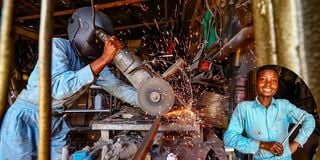
Lona Nyaloya Omusula operates a cutting machine workshop at a workshop near Fagilia stage in Utawala, Nairobi on September 21, 2024.
Amidst the sharp hiss of metal grinding against metal and the crackling buzz of a welding machine, 25-year-old Lona Nyaloya Omusula is calm, sparks flying around her as she cuts through steel with expert precision.
In a workshop filled with the scent of burning metal and the constant clang of tools, Lona works with confidence and skill, wearing a light-blue cotton apron and safety goggles.
“People don’t expect to see a woman doing this,” she says, her eyes crinkling with a grin as she momentarily lifts her welding mask, her voice almost drowned by the hum of the machinery.
“But I’ve proven that welding isn’t just for men—it’s for anyone with the passion to learn and the will to work hard.”
For Lona, welding is more than a job—it is a calling, one she has honed for five years to create everything from shoe racks to gates, windows, and tables.
Her journey into welding was not premeditated. Growing up, her earliest memories in Nairobi include watching her father, Christopher Waswa, a skilled welder with over 40 years of experience, handle metal with deft hands.
She would accompany him to the workshop, which was often filled with the sounds of cutting, grinding, and welding as her father built a reputation for quality craftsmanship among his competitors.
“I always admired how my dad worked,” Lona recalls. “He was always so focused, and he took pride in every piece he made. I used to watch him for hours, fascinated by how he could turn a rough piece of metal into something useful, something beautiful.”
However, despite her admiration, Lona initially had other plans.
After completing her primary education at Ebubala Primary School in Butere and her secondary education at St Anne’s Musoli Girls, she enrolled at The Co-operative University of Kenya for a two-year diploma in business management.
“Just like any other person, I thought I would be employed in an office somewhere wearing neat clothes,” she admits with a shrug.
“But after I finished Form 4 in 2018, I was so idle. I had to wait before starting my diploma, and sitting at home just wasn’t for me.”
In February 2019, with curiosity and a desire to stay active, she approached her father and asked if she could join him in the workshop which is located in Utawala, Nairobi.
“I didn’t think it would be my career at first. I just wanted to help out and learn something new. But in the process, I started enjoying it. The smell of metal, the challenge of getting everything just right—it gave me a sense of purpose.”

Lona Nyaloya Omusula takes measurements at a workshop near the Fagilia stage in Utawala, Nairobi on September 21, 2024.
Her father became her teacher, patiently showing her how to handle the welding machine, how to measure and cut metal, and how to grind down edges for a smooth finish.
“He didn’t go easy on me just because I was his daughter,” Lona laughs. “He made sure I learned everything the hard way, just like any apprentice would. And I’m grateful for that because now I know the value of hard work.”
As Lona honed her skills, she quickly realised that being a woman in the welding industry came with its own set of challenges.
“There aren’t many women in this field, and sometimes people don’t take you seriously at first,” she admits. “When a client walks into the workshop, they’re usually surprised to see me behind the welding machine. Some even doubt I can do the work as well as a man.”
In the beginning, the doubts were discouraging, but Lona saw them as an opportunity to prove herself.
“I had to build my confidence and let my work speak for itself. The more I worked, the more customers saw that I could handle the job—and handle it well.”
Despite the skepticism, Lona has found that being a woman in welding also has its advantages.
“There are clients who come to me specifically because I’m a woman,” she says. “They tell me they want to support me because they see how hard I work in a field where not many women are. One time, a mother and her daughter were passing by the workshop, and the daughter saw me working. They came in and asked about a bed frame, and when they found out I was the one who would be making it, they insisted on ordering from me.”
These moments of support and encouragement have helped Lona build a loyal customer base.
“People like to see women succeeding in areas that are traditionally male-dominated. It inspires them, and it makes them want to support you.”

Lona Nyaloya Omusula operates a welding workshop at a workshop near Fagilia stage in Utawala, Nairobi on September 21, 2024.
For Lona, welding isn’t just about defying expectations—it’s about the satisfaction of working with her hands and creating tangible products.
“There’s something incredibly rewarding about taking raw materials and turning them into something useful,” she says. “Whether it’s a shoe rack, a gate, or a table, I know that what I’m making will be used by someone in their daily life. It’s not just about making money—it’s about creating something that has a purpose.”
She believes that technical skills like welding are an important alternative to traditional career paths, particularly for young people.
“Gone are the days when everyone wanted to be a doctor or a lawyer,” Lona says. “Handwork pays, and it pays well. You use your hands, your brain, and your creativity. There’s no need to waste time chasing interviews or office jobs if you have a skill you can use to make a living.”
Lona’s message to young women is simple: “If you have the passion, go for it. Don’t let anyone tell you that a job is not for you just because you’re a woman. There are plenty of opportunities in technical fields, and women can excel in them.”
Overcoming the challenges- safety and sacrifice
While Lona loves her work, it has not been without its challenges. One of the first things she learned was that safety is paramount in welding.
“When I first started, my eyes hurt after a long day of welding. It’s a common issue for beginners because you have to learn how to protect your eyes properly.”
She quickly adapted, learning to use protective equipment and techniques to minimise the risks.
However, there was one challenge she didn’t expect: shaving her hair.
“When I started, I had long hair, and it kept drawing attention,” she recalls. “People would stare at me while I worked, and as someone who is naturally shy, it made me uncomfortable. But the bigger issue was that the sparks from the welding could easily catch my hair on fire.”
After some consideration, Lona decided to shave.
“It was a practical decision. My hair was becoming a distraction and a safety hazard. Plus, I realised I wasn’t that attached to it anyway,” she says with a laugh. “I don’t miss it at all.”

Lona Nyaloya Omusula sprays paint at a workshop near Fagilia stage in Utawala, Nairobi on September 21, 2024.
Her father’s presence in the workshop has also been a source of strength and mentorship.
“Having my father around has made a huge difference,” she says. “He’s always there to offer advice and guidance, and he helps me overcome any challenges that come my way. I’m lucky in that sense—I know not everyone has that kind of support.”
Work-life balance
Balancing her work in the workshop with her personal life can be challenging, but Lona has found ways to manage.
“It can be tough to juggle everything because we have a lot of work, and it’s just me and my dad handling all the orders.”
Lona’s day starts early, with household chores before she heads to the workshop. “I wake up, clean the house, take tea, and then head to work. My dad gives me a to-do list, and I get started right away. We usually have several projects going on at once, so I prioritise based on what’s needed the most urgently.”
Despite the long hours, Lona has found ways to maintain a healthy work-life balance.
“If I need a break, I just talk to my dad,” she says. “He understands that sometimes I need time off to recharge. When I come back, I’m more energised and ready to get back to work.”
In a week, she says she can earn between Sh3,000 and Sh5,000 depending on sales.
“It’s my father’s workshop and he ‘pays’ me depending on the sales we make that week.”
In the future, she says, “I dream of having my own space one day—a workshop where I can take on bigger projects, employ other young welders and even train more women in this field.”






